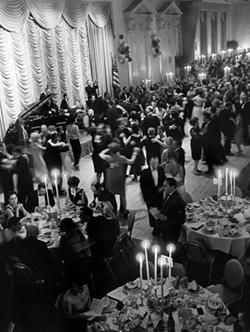Browse through a year by year history of the DGA Awards. Click on the timeline above for winners, photos, video and information about past DGA Awards.
An Overview of the DGA Awards
In 1948, George Marshall, the President of the Screen Directors Guild (which became the Directors Guild of America, Inc. in 1960) announced to its senior members that the Guild would begin an Awards program to honor directors for their directorial achievement. Awards would be given on a quarterly basis, and would culminate in the presentation of the Annual Award for the Best Directorial Achievement to the winning director at the General Membership Meeting.

The selection process was envisioned as a Guild family affair, free from prejudice and unhampered by outside influence. It was determined that the senior members themselves were to be the judges and the jury because no person was better qualified to pass judgment on the creative ability of the director than the directors themselves.
The original members of the Awards Committee included George Sidney, Frank Capra, Delmer Daves, John Ford, Bruce Humberstone, Irving Pichel, Norman Taurog and Ex-officio George Marshall.
The quarterly winners in 1948 were Fred Zinnemann for The Search, Howard Hawks for Red River, Anatole Litvak for The Snake Pit and Joseph Mankiewicz for A Letter to Three Wives. The winner of the first Annual Award for Best Directorial Achievement in 1948 was Mankiewicz who was presented with his Award at the Los Angeles Roosevelt Hotel.
Six decades later, the Awards have grown to include television, documentaries, commercials, and Special Guild Service Awards including the Guild's highest honor, the Lifetime Achievement Award.
Only twice since 1970, when the current method began of selecting five nominees from which one winner is chosen, has a director received two DGA Feature Film nominations in the same year. In 1974, Francis Ford Coppola was nominated for both The Godfather Part II and The Conversation (Coppola received that year's DGA Feature Film Award for The Godfather Part II); Steven Soderbergh was nominated for both Erin Brockovich and Traffic for the year 2000.
The DGA Award for Outstanding Directorial Achievement in Feature Film has traditionally been a near perfect barometer for the Best Director Academy Award. Only eight times since the DGA Award's inception has the DGA Award winner not won the Academy Award:
1968: Anthony Harvey won the DGA Award for The Lion in Winter while Carol Reed took home the Oscar® for Oliver!. 1972: Francis Ford Coppola received the DGA's nod for The Godfather while the Academy selected Bob Fosse for Cabaret. 1985: Steven Spielberg received his first DGA Award for The Color Purple while the Oscar® went to Sydney Pollack for Out of Africa. 1995: Ron Howard was chosen by the DGA for his direction of Apollo 13 while Academy voters cited Mel Gibson for Braveheart. In 2001 Ang Lee took home the DGA Award for Crouching Tiger, Hidden Dragon, while the Oscar® went to Steven Soderbergh for Traffic. In 2003 Roman Polanski received the Academy Award for The Pianist, but the DGA Award went to Rob Marshall for Chicago. 2012: Ben Affleck won the DGA Award for Argo, while the Academy chose Ang Lee for Life of Pi. For the year of 2019, Sam Mendes won the DGA Award for 1917 but the Oscar® went to Bong Joon-ho for Parasite.